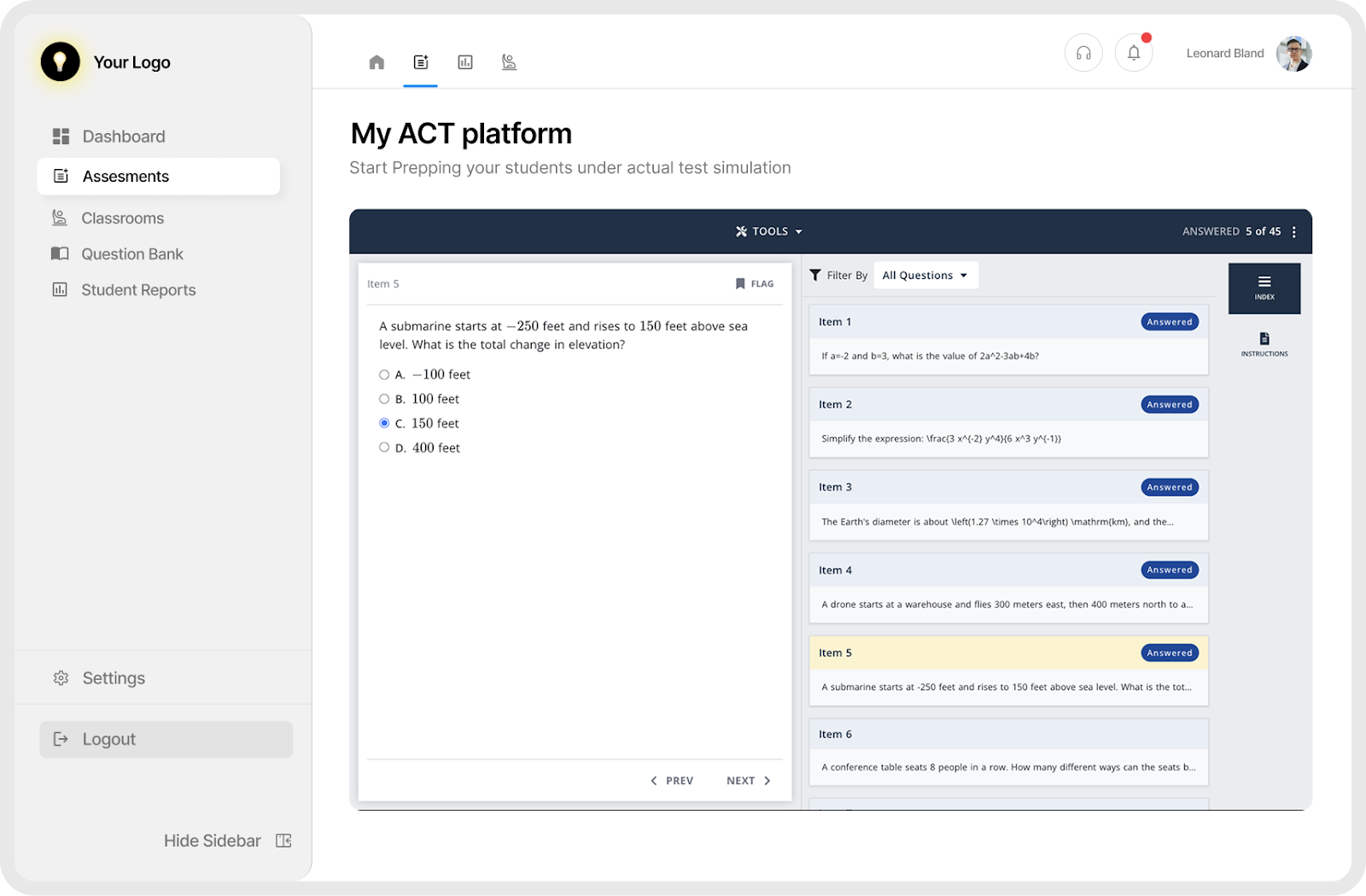




Key Takeaways
- Understand national and section-wise ACT score averages for better student benchmarking.
- Use percentile rankings to set realistic goals for college admissions.
- Tailor tutoring strategies using state and school-specific ACT score data.
As an SAT/ACT tutor you’re probably frequently asked questions like:
- "What's a good ACT score?"
- "How do I compare to other test-takers?"
You’re trusted to help students navigate college admissions, set realistic expectations around average scores, benchmarks, and create effective preparation strategies.
However, the ACT national average score is more than just a benchmark. It's a critical tool for gauging student performance and identifying areas that need improvement.
You need to understand terms such as ACT composite score average, and section-wise breakdown. With this information, you can guide your students toward their target schools and develop personalized study plans.
However, average ACT scores vary significantly across different demographics, states, and college-bound populations.
In this comprehensive guide, we'll explain everything you need to know about ACT average test scores—from national benchmarks to section-wise performance data.
We'll also explore how you can use EdisonOS's advanced reporting and analytics features to track your students' progress against these national averages, ensuring they're prepared for test day success.
What’s the average ACT score?
The ACT is scored on a scale from 1 to 36, with higher numbers reflecting stronger performance.
Each test-taker receives a composite score, which is the average of the four main section scores: English, Math, Reading, and Science.
This composite score also corresponds to a percentile ranking, showing how students performed compared to the national testing population.
The national average ACT composite score for the high school class of 2024 was 19.4, compared to the 19.5 average for the class of 2023. This represents the lowest composite score since 1990, meaning half of all test-takers score above this mark and half score below.
Here’s what percentiles mean:
- 50th percentile = National average score (approximately 19-20)
- 75th percentile = Score of 24+ (29% of students score at or above this level)
- 90th percentile = Score of 28+ (highly competitive for top-tier schools)
Looking at section-specific trends, the ACT math average score tends to be slightly lower than the English section, so if math isn’t your strongest subject, you're not alone.
Based on recent data, the section averages are:
- English average score: 18.7
- Math average score: 19.1
- Reading average score: 20.2
- Science average score: 19.7
These variations are part of what makes understanding your results through an ACT scoring chart so helpful. It puts your performance into context and shows where you shine or might need improvement.
Understanding these benchmarks becomes even more powerful when you can track your students' progress against them.

EdisonOS's comprehensive reporting system allows you to benchmark student performance using detailed analytics, compare individual progress against national averages, and identify specific areas where students need focused attention, turning raw score data into actionable insights for more effective tutoring.
Do average ACT scores matter?
Average ACT scores absolutely matter—but not in the way many students and parents initially think. As a tutor, understanding how to frame these averages for your students and their families is crucial for setting realistic expectations and building effective preparation strategies.
While raw ACT scores provide one data point, percentile rankings give context that's far more meaningful for college admissions. An ACT score percentile ranking compares your score to those of other test-takers, helping to measure your performance. When you explain to students that scoring in the 68th percentile means they've outperformed 68% of test-takers nationwide, it helps them understand their competitive position.
Colleges use this ranking to assess and compare applicants, but what constitutes a "strong" score varies dramatically by institution. For your students, this means you need to research target schools individually rather than relying on national averages alone.
Current benchmarks for context
The national average ACT composite score for the high school class of 2024 was 19.4. Students scoring in the 20-22 range are performing near or slightly above this average. However, the competitiveness of this score depends entirely on their target schools:
- Community colleges and regional universities: Scores around the national average (19-21) are often competitive
- State universities: Typically look for scores in the 22-26 range
- Selective institutions: Often expect scores in the upper 20s to low 30s
- Highly selective schools: For highly selective institutions, aiming for an ACT score above 30 can significantly enhance your application.
As a tutor, your job is helping students understand that average scores provide a helpful baseline, but their personal goals should reflect the admissions standards of schools on their target list.
Section-wise breakdown of average ACT score
The ACT is divided into four main sections: English, Math, Reading, and Science. Each section is scored individually on a scale of 1 to 36. Your ACT composite score average is calculated by taking the average of these four section scores.
Understanding the average score for each subject helps you identify where students typically perform strongest or weakest. It also gives you a clearer idea of how your section scores compare to national trends.
Section-wise breakdowns help you pinpoint exactly where students need the most support and where they might already be competitive. This granular analysis allows you to allocate tutoring time more effectively and show students (and parents) concrete areas of progress.
Here’s a quick look at the section-wise average scores based on recent data:
Key insights for tutoring strategy
The data reveals several important patterns:
- Reading scores highest: Students generally perform best in Reading, making this a potential confidence-building section
- English scores lowest: This presents the biggest opportunity for score improvement through targeted grammar and rhetorical skills practice
- Math performance: Despite being in the middle range, Math often shows the most dramatic improvement potential with focused practice
- Science consistency: Scores fall in the middle, but this section responds well to test-taking strategy coaching.
When working with students, use these averages as reference points. A student scoring above 21 in any section is already outperforming roughly 50-60% of test-takers. Scores of 24-25 or higher place students in the upper quartile, making them competitive for selective institutions.
Average ACT scores by state
While the ACT is a nationally standardized test, average scores can vary significantly depending on the state. This is often due to differences in participation rates, education funding, curriculum focus, and whether the ACT is a required test in public schools.
State-level data helps you:
- Set realistic benchmarks based on regional performance
- Understand the competitive landscape for local colleges
- Explain score context to students and parents
- Identify whether your students are competing primarily locally or nationally.
States with lower averages often have mandatory ACT testing for all students, which can bring down the overall number. Meanwhile, states with fewer, more college-focused test-takers tend to have higher averages. As more schools begin adopting the digital ACT format, these trends may shift slightly in the coming years, but for now, they offer a useful snapshot of academic performance across the country.
Nine states had 100% participation rates in 2024, which significantly impacts their averages. Wyoming had the highest average composite score at 19.1 among 100% participation states, followed by Tennessee at 18.8.
When working with students, consider their state context:
- High-participation states: Students may need higher scores to stand out locally.
- Selective-participation states: Competition may be more intense among test-takers.
- Regional college applications: Understanding whether students are applying locally or nationally affects target score recommendations.
Average ACT scores for colleges
Understanding college-specific ACT score ranges is one of the most practical ways tutors can help students set realistic targets and develop focused preparation strategies. Most universities have a score range—typically between the 25th and 75th percentiles—that reflects what their admitted students usually score.
When colleges report ACT ranges, they typically show:
- 25th percentile: 25% of admitted students scored at or below this number
- 75th percentile: 75% of admitted students scored at or below this number
- Middle 50%: The range between these percentiles represents the "typical" admitted student
For tutoring purposes, students scoring within or above a school's middle 50% range have competitive scores for admission.
Here’s a snapshot of typical ACT score ranges for a mix of competitive and popular U.S. universities:
For highly selective institutions, aiming for an ACT score above 30 can significantly enhance your application. However, it's important to help students understand that ACT scores do play a role in the admissions process, but they are just one aspect considered by colleges.
When working with students, you can help them plan their admission strategy using the following distinctions:
- Reach schools: Target scores at or above the 75th percentile
- Match schools: Aim for scores within the middle 50% range
- Safety schools: Look for schools where the student's score exceeds the 75th percentile
Remember that different colleges have varying average ACT score ranges. While some universities may look for students with scores in the 30s, others may consider scores in the mid-20s as competitive. Many excellent state universities, regional colleges, and specialized programs welcome students with scores in the 22-28 range.
Maximize your students' ACT average score potential with data-driven insights
Understanding average ACT scores is just the beginning of effective test preparation. As a tutor, you now have the data and context needed to set realistic expectations, identify improvement opportunities, and guide your students toward their target colleges.
Whether your students are aiming for highly selective institutions requiring scores in the 30s or solid state universities where mid-20s scores are competitive, the key is translating these national benchmarks into personalized preparation strategies.
Remember that while average scores provide valuable context, every student's journey is unique—and with the right tools and guidance, significant score improvements are always possible.
EdisonOS's comprehensive analytics platform takes the guesswork out of ACT preparation by providing detailed reporting, customizable benchmarks, and real-time progress tracking that turns these national averages into actionable insights for your tutoring practice.
Book a demo with EdisonOS today!
Frequently asked questions
1. Why is an average ACT score essential?
An average ACT score is a useful benchmark for students to evaluate where they stand compared to others nationwide. It helps you understand whether you're on track for your college goals or if there's room for improvement.
While not every school demands top-tier scores, being close to or above the ACT national average score can increase your chances of admission, especially at mid- to high-tier universities. Plus, it’s often used for scholarship eligibility and academic placement.
2. Does a good ACT ranking ensure admission?
Not necessarily. A strong ACT score—especially one that surpasses the ACT composite score average—strengthens your application, but it doesn’t guarantee acceptance.
Colleges also consider your GPA, coursework, extracurricular activities, essays, and recommendation letters. Think of your ACT score as one piece of a bigger puzzle. That said, scoring well still makes you a more competitive applicant, particularly for selective schools.
3. Why is the writing ACT average measured differently?
Unlike the main ACT sections, the optional Writing test is scored on a separate scale of 2 to 12, not the 1–36 scale used for other subjects. This is because it evaluates different skills, specifically your ability to organize and express ideas in written form. While it doesn’t affect your overall composite score, some colleges still review it, especially if writing is a core part of the program.
Just like how the ACT English average score and ACT math average score help highlight strengths in specific areas, the writing score gives insight into your communication skills.
Frequently asked questions

Tutors Edge by EdisonOS
in our newsletter, curated to help tutors stay ahead!
Tutors Edge by EdisonOS
Get Exclusive test insights and updates in our newsletter, curated to help tutors stay ahead!
Recommended Reads
Recommended Podcasts






.png)




.png)
.webp)
